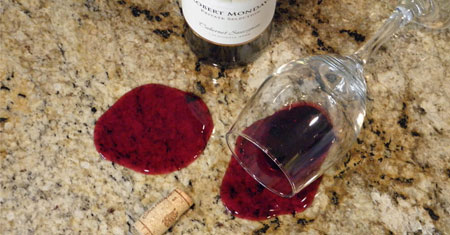Natural stone countertops are a massive investment. Shouldn’t you do everything in your power to properly care for them? They’re beautiful and typically very durable, but they still need proper care to remain damage-free and looking their best.

Cleaning Natural Stone Counters
First, clean up spills as soon as they happen. Porous stones like marble and granite can soak in spills. They can also stain with highly pigmented substances like coffee and red wine. It’s important to mitigate this risk by wiping up all spills immediately. Prompt cleaning is better for sanitation reasons as well. Use mild dish soap and water, or, better yet, a cleaning solution specifically designed for your stone counter. Abrasive cleaning solutions and scouring pads can cause damage to the surface and finish of the counter. Finally, always make sure to dry the counter with a clean, dry rag or dish towel to avoid potential hard water stains from water droplets left behind.
Natural Stone Counter Surface Damage
If you haven’t already, it’s time to invest in some good cutting boards and a trivet or two. Using a knife directly on your stone countertop is likely to cause scratches and other damage. Fortunately, a stone countertop expert can repair many minor nicks and scratches, but prevention is best. It’s important to note, too, that although granite and quartz are less likely to experience scratching, it can occur, and cannot be repaired. For the protection of your stone counters, it’s also crucial to keep direct heat off the countertops. Most natural stones are heat resistant, but this doesn’t mean heatproof. A hot pan placed directly onto the counter can cause thermal shock, scorch marks, and even cracking. Always use a trivet or even an oven mitt or towel to protect your stone counters from heat.
Sitting and Standing on Natural Stone Counters
If you’re the type to stand on your counters to reach the highest shelves or sit on them to have a chat while making dinner, it’s time to invest, instead, in a good, sturdy step ladder and a comfortable barstool. Countertops, natural stone or not, are not made to take the kind of pressure and weight caused by a person sitting or standing on them. With a natural stone in particular, this excess pressure can cause cracks in the stone. Granite is particularly susceptible to this due to the naturally occurring fissures in the stone. These fissures cause naturally weak spots that are liable to give way under excess, concentrated weight. As always, prevention is the best course of action, so it’s best to stay off. Although cracks in granite can be repaired, there is often a visible line left where the repair occurred. The last thing you want is a permanent reminder that you broke your expensive countertop because you didn’t want to grab the step ladder.
Natural stone counters are beautiful and durable for the most part, but they’re also a hefty investment. When making that sort of investment, it’s important to know the weaknesses of the material and take proper care and steps to extend the life of your counter and keep them looking as beautiful as the day they were installed.

